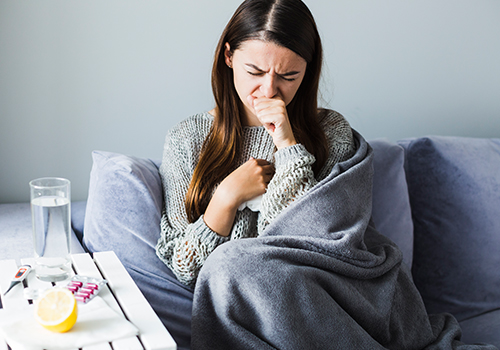Influenza Symptoms
Influenza (also known as the flu) is a contagious respiratory illness caused by flu viruses. It can cause mild to severe illness, and at times can lead to death. The flu is different from a cold. The flu usually comes on suddenly. People who have the flu often feel some or all of these symptoms:
- Fever* or feeling feverish/chills
- Cough
- Sore throat
- Runny or stuffy nose
- Muscle or body aches
- Headaches
- Fatigue (tiredness)
- Some people may have vomiting and diarrhea, though this is more common in children than adults.
* It’s important to note that not everyone with flu will have a fever.
Flu Complications
 Most people who get influenza will recover in a few days to less than two weeks, but some people will develop complications (such as pneumonia) as a result of the flu, some of which can be life-threatening and result in death.
Most people who get influenza will recover in a few days to less than two weeks, but some people will develop complications (such as pneumonia) as a result of the flu, some of which can be life-threatening and result in death.
Pneumonia, bronchitis, sinus and ear infections are examples of complications from flu. The flu can make chronic health problems worse. For example, people with asthma may experience asthma attacks while they have the flu, and people with chronic congestive heart failure may experience worsening of this condition that is triggered by the flu.
People at High Risk from Flu
Anyone can get the flu (even healthy people), and serious problems related to the flu can happen at any age, but some people are at high risk of developing serious flu-related complications if they get sick. This includes people 65 years and older, people of any age with certain chronic medical conditions (such as asthma, diabetes, or heart disease), pregnant women, and young children.
Flu Severity
Flu is unpredictable and how severe it is can vary widely from one season to the next depending on many things, including:
- what flu viruses are spreading,
- how much flu vaccine is available,
- when a vaccine is available,
- how many people get vaccinated, and
- how well the flu vaccine is matched to flu viruses that are causing illness.
How Flu Spreads
Person to Person
People with flu can spread it to others up to about 6 feet away. Most experts think that flu viruses are spread mainly by droplets made when people with a flu cough, sneeze or talk. These droplets can land in the mouths or noses of people who are nearby or possibly be inhaled into the lungs. Less often, a person might also get flu by touching a surface or object that has flu virus on it and then touching their own mouth or nose.
To avoid this, people should stay away from sick people and stay home if sick. It also is important to wash hands often with soap and water. If soap and water are not available, use an alcohol-based hand rub. Linens, eating utensils, and dishes belonging to those who are sick should not be shared without washing thoroughly first. Eating utensils can be washed either in a dishwasher or by hand with water and soap and do not need to be cleaned separately. Further, frequently touched surfaces should be cleaned and disinfected at home, work and school, especially if someone is ill.
The Flu Is Contagious
Most healthy adults may be able to infect other people beginning 1 day before symptoms develop and up to 5 to 7 days after becoming sick. Children may pass the virus for longer than 7 days. Symptoms start 1 to 4 days after the virus enters the body. That means that you may be able to pass on the flu to someone else before you know you are sick, as well as while you are sick. Some people can be infected with the flu virus but have no symptoms. During this time, those persons may still spread the virus to others.
 It’s almost unavoidable; the common cold is one of the most annoying parts of life, but there are symptoms that you can recognize early, and many remedies that can help your recovery process more bearable. In today’s day and age, there are countless over the counter medications, as well as home remedies that can help you feel relief from the common cold.
One of the main tricks for treating a cold is identifying it early. This season, at the first sign of a scratchy throat, runny nose, or cough, it is advised to start taking care of yourself because you are probably coming down with a cold. The common cold can actually be caused by over 200 viruses. All viruses that we call the common cold cause similar symptoms – itchy throat, body aches, headaches, mucus, and that dreaded cough. Learn how to protect yourself and your family from the common cold this season, and stay out of the doctor’s office.
It’s almost unavoidable; the common cold is one of the most annoying parts of life, but there are symptoms that you can recognize early, and many remedies that can help your recovery process more bearable. In today’s day and age, there are countless over the counter medications, as well as home remedies that can help you feel relief from the common cold.
One of the main tricks for treating a cold is identifying it early. This season, at the first sign of a scratchy throat, runny nose, or cough, it is advised to start taking care of yourself because you are probably coming down with a cold. The common cold can actually be caused by over 200 viruses. All viruses that we call the common cold cause similar symptoms – itchy throat, body aches, headaches, mucus, and that dreaded cough. Learn how to protect yourself and your family from the common cold this season, and stay out of the doctor’s office.


 Most people who get influenza will recover in a few days to less than two weeks, but some people will develop complications (such as pneumonia) as a result of the flu, some of which can be life-threatening and result in death.
Most people who get influenza will recover in a few days to less than two weeks, but some people will develop complications (such as pneumonia) as a result of the flu, some of which can be life-threatening and result in death.